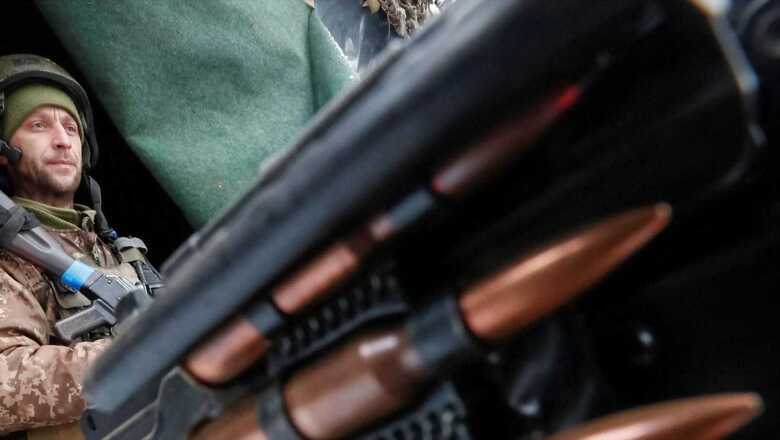
views
The brewing crisis in Eastern Europe may impact India in more ways than one even as New Delhi has tried hard to maintain a distance from the Ukraine issue. On Thursday, New Delhi’s purchase of the S400 missile defence system from Moscow though came under the scanner yet again and this time worryingly in the context of US-Russia tension over Ukraine.
To a question regarding how the United States-India bilateral relations could be impacted due to this deal and possibility of CAATSA sanctions, US state department spokesperson Ned Price said, “I think it shines a spotlight on the destabilising role that Russia is playing not only in the region, but potentially beyond as well. When it comes to CAATSA sanctions, you’ve heard me say before we haven’t made a determination with regard to this transaction, but it’s something we continue to discuss with the Government of India, given the risk of sanctions for this particular transaction under CAATSA. Whether it is India, whether it is any other country, we continue to urge all countries to avoid major new transactions for Russian weapon systems.”
CAATSA stands for Countering America’s Adversaries Through Sanctions Act. The law came into force in 2017 under the-then President Donald Trump to penalise Iran, Russia and North Korea. The US continues to say that sanctions under CAATSA are for adversaries and not meant to punish allies and partners. But when Turkey, a NATO ally, sealed its S400 deal with Russia, the US imposed CAATSA sanctions against it in December 2020. The state department statement said the sanctions were imposed “for knowingly engaging in a significant transaction with Rosoboronexport, Russia’s main arms export entity, by procuring the S-400 surface-to-air missile system”. This even as the statement acknowledged that “Turkey is a valued ally and an important regional security partner for the United States”.
Despite a threat of sanctions, India has stood its ground on the issue of S400 purchase. In fact, the first deliveries started at the end of last year. In 2019, as external affairs minister S Jaishankar held a press briefing with his then counterpart Mike Pompeo in New Delhi, he responded to a question by CNN-News18 about the threat of CAATSA sanctions due to the deal. Jaishankar said India has “many relationships with many countries. Many of them are of some standing, they have a history. So I think we will do what is in our national interest, and again, part of that strategic partnership is the ability of each country to comprehend and appreciate the national interest of the other.”
After Ned Price’s statement on Thursday, the MEA maintained the same line. Ministry of external affairs spokesperson Arindam Bagchi said that India maintains an independent foreign policy, which is also reflected in the defence purchases. All such engagements are in line with India’s national interest and security, he said
However, with an increased tussle between India’s comprehensive strategic partner, the US, and special and privileged strategic partner, Russia, articulating on the Ukraine crisis will certainly be a tightrope walk. For now, the MEA spokesperson has said, “We have been closely following the developments relating to Ukraine including ongoing high-level discussions between Russia and the US. Our Embassy in Kyiv is also monitoring local developments. We call for a peaceful resolution of the situation through sustained diplomatic efforts for long term peace and stability in the region and beyond.”
Meanwhile, for the first time in seven years, Brent prices surged to $90 a barrel on Thursday. This was primarily due to the escalating Ukraine crisis and also the tension in West Asia between the Houthis and the UAE due to its involvement in Yemen along with Saudi-led coalition forces. The prices could scale upwards due to possible supply chain disruptions in both these regions. The US, Russia and Saudi Arabia are the top three oil-producing countries of the world.
For Indians who had been battling domestic fuel price rise last year, this comes as bad news. The high fuel price that had started burning a hole in the pocket of middle-class India was revised downwards only in November last year. The question is if crude prices continue to rise or fluctuate, will the Centre and States go back to higher taxes? Could it also impact the Budget calculations which will be presented in Parliament next week?
All eyes will be on the February 2 meeting of OPEC+ which includes the Organization of the Petroleum Exporting Countries and allies led by Russia.
News18.com has learnt that at the official level, the EU has been exchanging its view over the Ukraine crisis with India. Ukraine is the second-largest Eastern European country in size and India was one of the first countries to recognise it. The Government of India recognised the Republic of Ukraine as a sovereign country in December 1991 and established diplomatic relations in January 1992. Ukraine opened its Mission in Delhi in February 1993, its first in Asia.
As per the MEA website, there are about 18,000 Indian students studying in Ukraine, mainly in the field of medicine. Indian business professionals work predominantly in the fields of pharmaceuticals, IT, engineering, medicine and education. In case of heightened tension, the safe repatriation of Indians also becomes a crucial matter to deal with. The US has already evacuated its diplomats from Kiev earlier this week.
For India, there is much at stake even though it may not be too obvious and while we could be lulling ourselves into a false sense of safety of physical distance from the crisis.
Read all the Latest News here
















Comments
0 comment